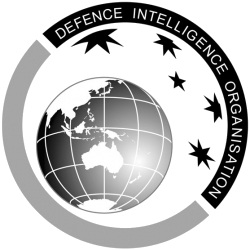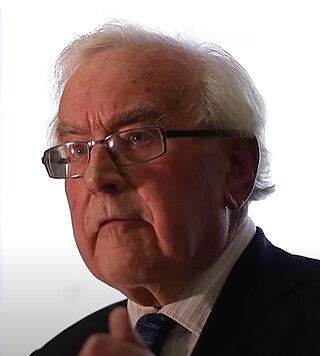
The Joint Intelligence Committee (JIC) is an interagency deliberative body of the United Kingdom responsible for intelligence assessment, coordination, and oversight of the Secret Intelligence Service, Security Service, GCHQ, and Defence Intelligence. The JIC is supported by the Joint Intelligence Organisation under the Cabinet Office.
The Australian Security Intelligence Organisation is Australia's national security agency responsible for the protection of the country and its citizens from espionage, sabotage, acts of foreign interference, politically motivated violence, attacks on the Australian defence system, and terrorism. ASIO is part of the Australian Intelligence Community and is comparable to the American FBI and the British MI5.

The Australian Secret Intelligence Service is the foreign intelligence agency of Australia, tasked with the covert collection of information overseas through personal contacts and other means of human intelligence. It is part of the Australian Intelligence Community and is also responsible for counter-intelligence and liaising with the intelligence agencies of other countries. ASIS was formed in 1952 but its existence remained secret within much of the government until 1972. ASIS is comparable to the American CIA and the British MI6.

The Office of National Assessments (ONA) was an Australian statutory intelligence agency established by the Office of National Assessments Act 1977 as an independent statutory body directly accountable to the Prime Minister of Australia as a portfolio agency of the Department of the Prime Minister and Cabinet. ONA provided all-source assessments on international political, strategic and economic developments to the Prime Minister and the National Security Committee of Cabinet. ONA also played a coordination role in the Australian Intelligence Community through evaluating foreign intelligence products, convening the National Intelligence Coordination Committee, and developing relationships with intelligence agencies around world.

Defence Intelligence (DI) is an organisation within the United Kingdom intelligence community which focuses on gathering and analysing military intelligence. It differs from the UK's intelligence agencies in that it is an integral part of a government department – the Ministry of Defence (MoD) – rather than a stand-alone organisation. The organisation employs a mixture of civilian and military staff and is funded within the UK's defence budget. The organisation was formerly known as the Defence Intelligence Staff (DIS), but changed its name in 2009.

The Defence Intelligence Organisation (DIO) is an Australian government military intelligence agency responsible for strategic intelligence and technical intelligence assessments, advising defence and government decision-making on national security and international security issues, and the planning and conduct of Australian Defence Force operations. The DIO does not collect intelligence or conduct covert action, but works on defence economics, transnational terrorism, and WMD.
The Defence Strategic Policy and Intelligence Group (SP&I) of the Australian Government Department of Defence is responsible for defence diplomacy, strategic policy, international security, and military intelligence co-ordination and advice to the Prime Minister of Australia, Minister for Defence, Secretary of the Department of Defence, and Chief of the Defence Force. The Defence Strategic Policy and Intelligence Group is led by the Deputy Secretary for Strategic Policy and Intelligence and comprises three policy divisions and two intelligence agencies.
The Australian Intelligence Community (AIC) and the National Intelligence Community (NIC) or National Security Community of the Australian Government are the collectives of statutory intelligence agencies, policy departments, and other government agencies concerned with protecting and advancing the national security and national interests of the Commonwealth of Australia. The intelligence and security agencies of the Australian Government have evolved since the Second World War and the Cold War and saw transformation and expansion during the Global War on Terrorism with military deployments in Afghanistan, Iraq and against ISIS in Syria. Key international and national security issues for the Australian Intelligence Community include terrorism and violent extremism, cybersecurity, transnational crime, the rise of China, and Pacific regional security.
New Zealand's intelligence agencies and units have existed, with some interruption, since World War II. At present, New Zealand's intelligence community has approximately 550 employees, and has a combined budget of around NZ$145 million.
The National Assessments Bureau (NAB), previously known as the External Assessments Bureau (EAB), is a New Zealand intelligence analysis agency within the Department of the Prime Minister and Cabinet (DPMC). The NAB along with the Government Communications Security Bureau and the New Zealand Security Intelligence Service is one of the three core members of New Zealand's intelligence community. It provides assessments to the Prime Minister, other Ministers, senior officials and New Zealand's diplomatic missions abroad, on events and developments that bear on New Zealand's interests, especially in regard to matters of national security.

Nicholas Peter Warner, is an Australian diplomat, intelligence official, public servant, and the Director-General of the Office of National Intelligence since 20 December 2018.
The Joint Intelligence Organisation is a British intelligence agency responsible for intelligence assessment and development of the UK intelligence community's analytical capability. It is headed by a Permanent Secretary-level civil servant.
The Royal Commission on Intelligence and Security (RCIS), also known as the First Hope Commission, was a Royal Commission established on 21 August 1974 by Prime Minister of Australia Gough Whitlam to reach findings and make recommendations as to the Australian Intelligence Community.
The Government of the United Kingdom maintains several intelligence agencies that deal with secret intelligence. These agencies are responsible for collecting, analysing and exploiting foreign and domestic intelligence, providing military intelligence, and performing espionage and counter-espionage. Their intelligence assessments contribute to the conduct of the foreign relations of the United Kingdom, maintaining the national security of the United Kingdom, military planning, public safety, and law enforcement in the United Kingdom. The four main agencies are the Secret Intelligence Service, the Security Service (MI5), the Government Communications Headquarters (GCHQ) and Defence Intelligence (DI). The agencies are organised under three government departments, the Foreign Office, the Home Office and the Ministry of Defence.

The National Security Committee (NSC), also known as National Security Committee of Cabinet, is the peak decision-making body for national security and major foreign policy matters in the Australian Government. It is a committee of the Cabinet of Australia, though decisions of the NSC do not require the endorsement of the Cabinet itself.

Paul Dibb AM is an English-born Australian strategist, academic and former defence intelligence official. He is currently emeritus professor of strategic studies at the Strategic and Defence Studies Centre that is part of the Australian National University.

The National Intelligence Coordination Committee (NICC) is a peak intergovernmental officials-level body of the Government of Australia responsible for the development and co-ordination of the Australian Intelligence Community in accordance with the National Security Committee of Cabinet. The NICC is chaired by the Director-General of the Office of National Intelligence.

The Admiralty War Staff was the former senior naval staff operational planning organisation within the British Admiralty that existed from 1912 to 1917. It was instituted on 8 January 1912 by Winston Churchill in his capacity as First Lord of the Admiralty and was in effect a war council whose head reported directly to the First Sea Lord. After the First World War ended, the War Staff was replaced by the Admiralty Naval Staff department.
The Department of Home Affairs is the Australian Government interior ministry with responsibilities for national security, law enforcement, emergency management, border control, immigration, refugees, citizenship, transport security and multicultural affairs. The portfolio also includes federal agencies such as the Australian Federal Police, Australian Border Force and the Australian Security Intelligence Organisation. The Home Affairs portfolio reports to the Minister for Home Affairs, currently held by Clare O'Neil, and is led by the Secretary of the Department of Home Affairs, Mike Pezzullo. In 2022, the Australian Federal Police, Australian Criminal Intelligence Commission and Australian Transaction and Analysis Center were de-merged from the department and moved to the Attorney General portfolio.
The Office of National Intelligence (ONI) is an Australian statutory intelligence agency responsible for advising the Prime Minister and National Security Committee, the production of all-source intelligence assessments, and the strategic development and enterprise management of the National Intelligence Community. The ONI is directly accountable to the Prime Minister of Australia as a portfolio agency of the Department of the Prime Minister and Cabinet.








